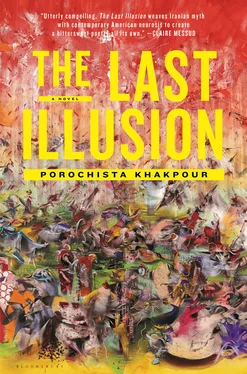Spike inched him up to the door; he could feel Spike’s body, like a mollusk’s shell covering him, coating him almost, moving for him, making slight pushing thrusts that were causing Zal to lose control.
“I’m sick, Spike! I’m sick!” Zal screamed as a last resort.
“C’mon, Zed!” He didn’t even know his name. “You can do it!”
Zal pulled his goggles off and yelled louder than he thought was possible. “NO! I am sick! Get me down now, fucker!”
It was the first time in his life that he had said it, the awful F-word. It felt, of course, awful.
But it worked: Spike shook his head and yelled something to the pilot and they made the landing in silence. On the ground, the jumpers were gushing and gasping and giving each other hugs and high-fives and taking photos with their undone parachutes.
The girl before him was crying, he noticed.
He went up to her. “I’m sorry you went through that. I actually didn’t do it.”
She looked up at him, laughing through her tears. “What?”
“I’m sorry they made you do it. .”
She laughed harder. “They didn’t make me! Oh, no, these are happy tears! It was the most amazing thing of my life!”
Happy tears. Zal nodded, embarrassed.
The girl skipped away to her man waiting for her, and Spike came back with a form. “I just need you to sign this to say you didn’t jump but you know you still owe us the money,” he said gruffly, not looking him in the eye, no hand signals, no grins, nothing.
Zal signed. “I wanted to fly, not fall,” he tried to explain. “That was just falling.”
“Whatever, man,” said Spike, and he walked away. Zal stood on the empty knoll and stared at the sky. A group of divers were coming down from another plane, just little black dots in the sky, like a flock of birds, looking not like bodies dropping with no choice but like floating — indeed, flying — things.
He had learned a lesson, he supposed: things were not as they seemed. What seems one way might actually be the opposite. What a human he was becoming, he thought. What a stupid human.
Plus, with Asiya now condemned to months in the clinic — on a whole special program, with special foods and special medications and special exercises and special counseling, what her mother, wherever she was, had demanded when she had gotten word from the hospital — what else did he have to do but court death? He had passed the test: he was afraid of it. Normal. He knew that was true because he had concluded one amazing thing recently, which even Rhodes couldn’t have said better: it wasn’t Asiya’s fear that she was going to die that made her insane — everyone feared that and, of course, it was ultimately a true thing — It was her fear that they all were, together, in the very near future.
It was time to move on to the next thing, he thought, what the closest he had to a wise man had once suggested. It was time for a job.

He talked to Asiya a few times a week when she was allowed to take phone calls. Every time, he could barely hear her whisper versus the loud clangs of that clinic in New Jersey that sounded more, he imagined, like a soup kitchen than a hospital. He had asked if he could visit her and she had said no, that she didn’t want anyone to see her while she underwent “the phony transformation.”
“What do you mean by that, Asiya?” Zal would ask. “That they make you eat?”
“Zal, they can change my body, but they can’t change my mind,” she would often say.
One day, sounding more “meds-y” than usual, she told him, “Okay, they are changing my mind — I’m all mixed up, Zal — but it’s temporary. When I come home, I’m off this stuff.”
“You won’t want to be,” Zal said. “They’re fixing you. Just do what they say.”
“You don’t even know,” she shot back — a common line in that phase that he just ignored.
“Trust me,” he said. “In a lot of ways, they fixed me, baby.”
Baby : he had started calling her what men called their women. Baby was a normal thing to call a woman you loved, he knew this. In her absence, he possessed her more wholly than ever.
For that reason, he was happy she was there. He was also happy for other reasons. It wasn’t like the time she was mad at him; this time her absence gave him space to breathe and think and remember himself without her. He started to remind himself of things he liked to do, and he thought of others he could grow to like to do as well. He decided he’d use this time to complete any final steps to normalcy, while Asiya completed hers.
Of course, with any journey to enlightenment, one falls here and there. The skydiving, with its giving in to old bird fantasies, was one fall — but he had managed at the last minute to escape it. The insect candies were another — he tossed a large bag of them all out one day, swearing to never order a single treat box again. The bird dreams were another, and of course the hardest to control, so he started watching horror movies and porn — what normal men did, he knew — so they’d seep into his dream life. They hadn’t, but he knew that with enough consumption, they would.
He started wearing a New York Yankees baseball cap. He started to curse more. He started to look no one in the eye. He started to stare at women in the chest or ass and tell himself to imagine them naked, underneath him. He started to watch the news, keep up with the weather, even watch an occasional sports game. He started to do push-ups and sit-ups more and more. He started to feel insecure, depressed, horny, irrational, frustrated, reckless. He started to focus on cultivating it all, consciously, fully, wholeheartedly — feeling like a man, and not just any man: an American man.
On a particularly gray and dull late autumn afternoon, he decided to do something he’d never done before: he went to a bar alone, a little Irish pub on a corner that boasted with its chalkboard sign, happy hour daily, 2 for 1 complete menu.
By that point Zal, whether nervous or not, had learned how to learn things. One way was simply coming up with savvy ways to ask.
“So, guys,” he asked the two men, also in caps, behind the bar. “If there was one drink guys like me — regular guys — order the most at this bar, what would it be?”
One of the guys laughed. “What, you doing research?”
“Just wondering, guys!” Zal said, trying to push his face into a grin, something he’d been practicing lately, but put his hand over it quickly. He was still wary of displaying the fruits of his efforts, as they often looked more like an expression of horror. “I’m sick of my usual and wondering if my usual is usual, you know?”
The other guy snorted. “They get a beer, smart guy, maybe a Guinness.”
“Oh, it’s been a while since I had that,” Zal shot back. “I’ll have that.”
“You’ll have what?”
“That!” He didn’t want to fumble the pronunciation.
“Smart guy wants a Guinness?”
Zal nodded, trying hard to make the nod casual.
When the tall foamy dark drink in the pint glass was set before him, he drank it quickly. It was indeed good; he felt seduced by its creaminess. He finished it fast. “Another,” he said, making a thumbs-up sign.
He drank four pints of Guinness in an hour, left what he hoped was a great tip, and stumbled onto the street, which was still too light for him to give up on the day.
He began to automatically head uptown, without thinking where, and minutes later he realized he was on Asiya’s doorstep. Where Asiya wasn’t. Where her brother who still hated him lived, where just next door lived Zachary’s friend who had made out with him and probably hated him, too, where a very large beautiful woman who made his heart race in a way he couldn’t even begin to explain sat on a bed with wheels, day after day, waiting for nothing. He had no place there.
Читать дальше













